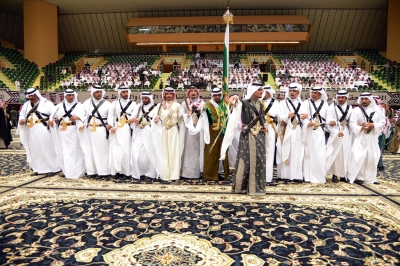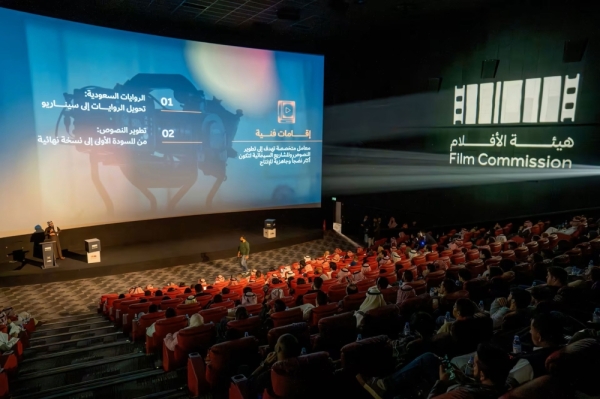
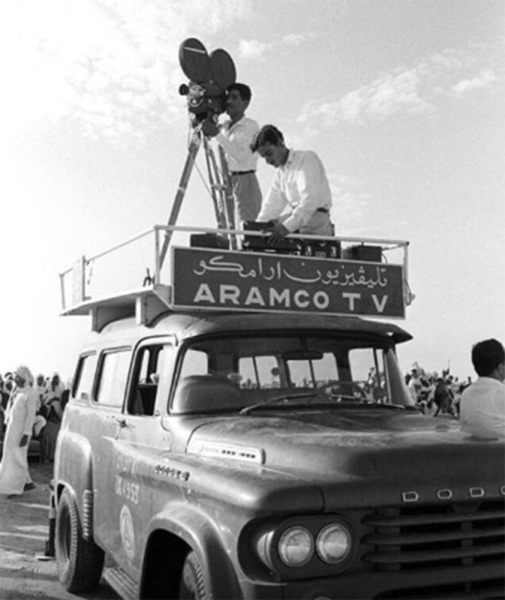
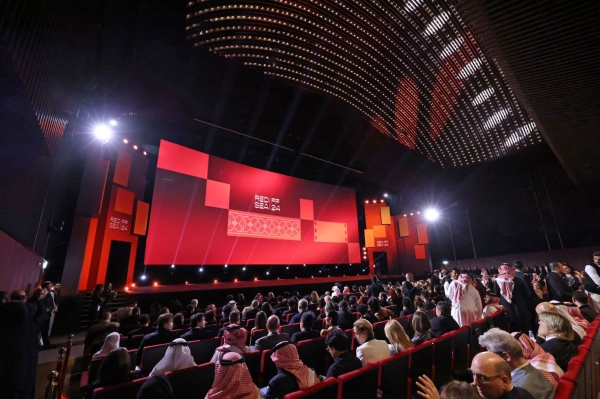


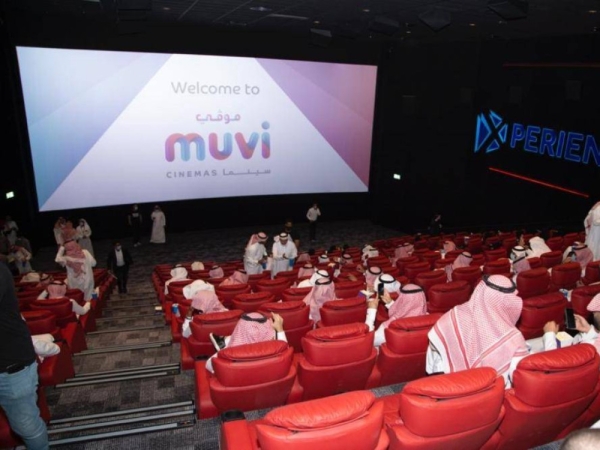
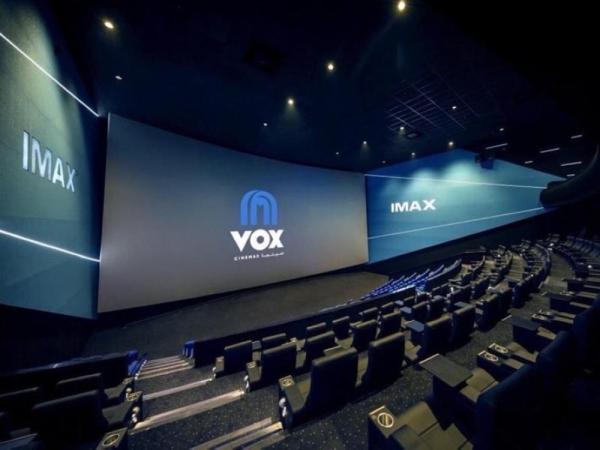
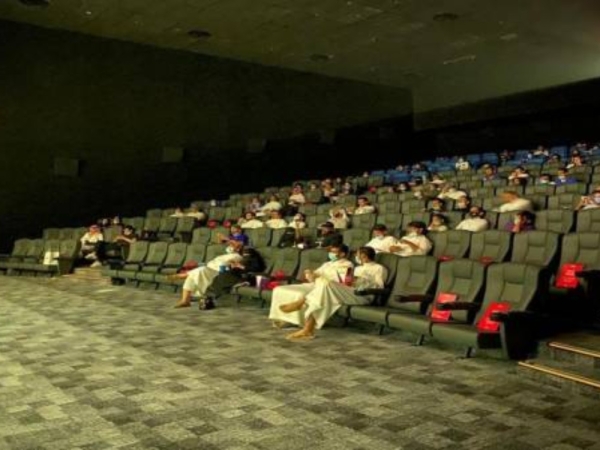
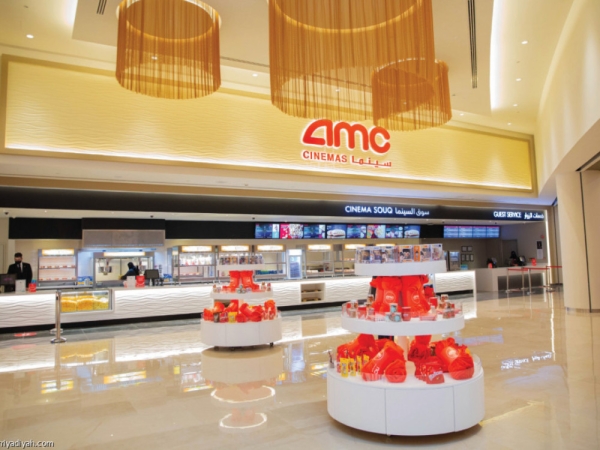




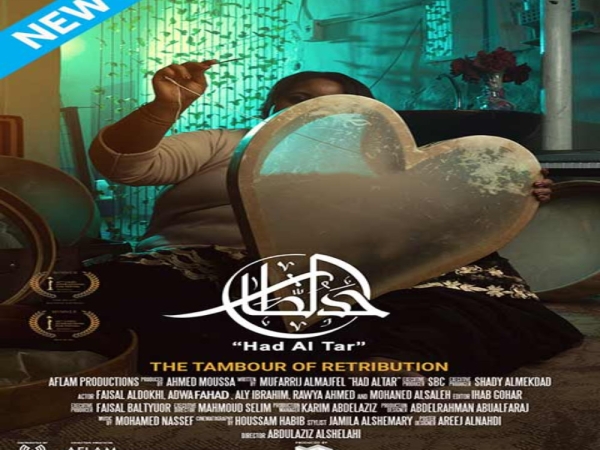
Cinema in the Kingdom of Saudi Arabia represents a developing sector that serves the film industry and organizes visual shows in cinema halls equipped with modern standards. This sector is under the supervision of the Film Commission of the Ministry of Culture.
History of cinema in Saudi Arabia
Cinema appeared in the Kingdom at the beginning of the 1950s, with the first local film, "The Flies," produced by Saudi Aramco in 1950 and starring Hassan al-Ghanem, who is considered the first Saudi cinematic actor. The first feature-length film about the Kingdom was produced in 1955, entitled "The Arabian Peninsula," featuring a number of local actors. The official history of Saudi cinema dates to 1975, marked by the release of the film "Development of Riyadh City" by Saudi director Abdullah al-Muhaisen, which participated in the Documentary Film Festival in Cairo. In 1976, Al-Muhaisen released another documentary, "Assassination of a City," which won the Nefertiti Award for Best Short Film and was also shown at the Cairo Film Festival in 1977. The majority of local film production continued through the private al-Muhaisen Production Company until the beginning of the 1990s. Afterward, the production of Saudi feature films ceased until the beginning of the third millennium.
Even though film screenings ceased in the Kingdom in the early 1980s, they were occasionally active in sports clubs and some homes. However, the filmmaking process persisted, with several Saudi films being produced through the individual efforts of young amateurs. Some of these films were showcased in local festivals and gatherings and took part in Arab and Gulf festivals.
The overall Saudi film experiences over the forty years prior to 2018 were limited to the categories of feature and short films, encompassing branches of drama, comedy, and documentaries. By 2022, the number of Saudi films participating in the Red Sea International Film Festival and the Saudi Film Festival reached about 364, indicating increased production in the sector.
In 2008, the Saudi Film Festival was inaugurated in Dammam City. During its inaugural session, forty-four films were screened across three tracks: narrative short films, short documentaries, and screenwriting.
The first Saudi feature film to win awards at the Venice International Film Festival
In 2012, there was a notable shift in the production of Saudi cinematic films when Haifa al-Mansour directed "Wadjda." Shot entirely within the Kingdom, the film embraced a Saudi identity and featured Saudi actors. It garnered three awards of appreciation at the Venice International Film Festival, marking it as the first Saudi feature film to receive an award at this prestigious event.
The first Saudi short film to participate in the Berlin International Film Festival
The short feature film "Hurma," directed by Ahd Kamel, participated in the official short film competition at the Berlin Film Festival during its 2013 session. It marks the first time a Saudi film has participated in this festival.
The first Saudi feature film to be shown at the Berlin Film Festival
The film "Barakah Meets Barakah" premiered in 2016 as the first feature film to be showcased at the Berlin Film Festival. Directed by Saudi filmmaker Mahmoud Sabbagh, it was also featured in various Arab and international film festivals. The film garnered multiple awards and earned a nomination for the International Academy Award in the Foreign Film category.
Revitalizing the cinema sector in Saudi Arabia
Revitalizing the film sector in the Kingdom is one of the goals of the Quality of Life Program, a program of Saudi Vision 2030. Entities, competitions, and government initiatives have been established to serve the Saudi film industry, such as the Film Commission affiliated with the Ministry of Culture.
Cinemas were reopened in the Kingdom in 2018, with the regulation of their operation entrusted to the international AMC Entertainment Holdings. Various companies, including Vox Cinemas and muvi Cinemas, operate cinemas in the Kingdom. In 2023, the number of cinemas reached approximately sixty-six, spread across twenty Saudi cities, totaling 607 screens with a seating capacity of 62,530.
The first Saudi dramatic film screened in cinemas in Jeddah and Riyadh
"Roll'em" is the first Saudi feature film to be screened in cinemas in Jeddah and Riyadh in 2019. All its scenes were filmed in Jeddah City, under the direction of Abdulelah Alqurashi. Film production then continued with the emergence of more talents in the fields of directing, acting, and screenwriting.
Saudi efforts to develop the cinema sector
The Kingdom is making efforts to support and develop the cinema sector by organizing and hosting dedicated events, clubs, as well as local and international festivals. These include:
Red Sea International Film Festival
It is an international film festival held in Jeddah City, west of the Kingdom. It supports the local film sector and aims to enrich cinematic content, both locally and regionally. The festival receives all types of cinematic, television, and interactive films, both Arab and international. Established in 2019, it is part of several initiatives of the Ministry of Culture.
The festival is committed to upholding international cinema standards. Its sections include the Red Sea Competition, featuring feature films, documentaries, and animated films, the Red Sea: Shorts Competition, limited to films no longer than sixty minutes, the New Saudi/New Cinema, and International Spectacular, showcasing significant directors globally. It also presents films premiering for the first time in the Arab world, alongside commercial and independent Arab films. Additional sections include the Red Sea: Series, Red Sea: New Vision, Red Sea: Families and Children, Red Sea: Treasures, and international selections from prominent film festivals.
Saudi Film Festival
It was established in 2008 in Dammam City (later moved to Dhahran) and is considered a Saudi cinema platform focused on developing and empowering contemporary filmmaking in the Kingdom. The festival was founded and organized by the Saudi Arabian Society for Culture and Arts in Dammam, in partnership with the Eastern Province Literary Club, under the name of the Saudi film competition, in its 2008 session.
The festival halted for about seven years, then the Saudi Arabian Society for Culture and Arts relaunched it under the name of the Saudi Film Festival for a second session in 2015, expanding its activities. It continued to be organized until the ninth session in 2023, hosted by the Cinema Society in partnership with the King Abdulaziz Center for World Culture (Ithra) in Dhahran. Supported by the Film Commission of the Ministry of Culture, the festival organizing committee agreed to transfer all rights, mechanisms, and obligations for organizing the festival in its upcoming sessions from the Society for Culture and Arts to the Cinema Association.
Cinema Colors Club
Established in 2021 in Jeddah Governorate, the club is one of the artistic and cultural gatherings for amateurs, specialists, students, and talented individuals in the cinematic field. It covers all categories of production, acting, directing, and photography, allowing participants to share their expertise and experiences while focusing on developing, qualifying, and training talents in the film industry, technically, culturally, artistically, and intellectually. The club is part of the 'Hawi' platform, one of the Quality of Life initiatives in the Kingdom.
The club aims to highlight and discover young talents in the cinema sector, help and empower those interested, and qualify skilled individuals to compete in the global cinematic field. Additionally, it works to create high-quality cinematic works.
Transferring the jurisdiction of the film sector to the Film Commission
In 2024, the Council of Ministers approved transferring the jurisdiction of the films and cinema sector from the General Authority for Media Regulation to the Film Commission. The first stage of the transfer included all aspects related to cinema, including its licenses. These licenses encompass the permanent and temporary cinema theater operating license and specialist needs, operating license for permanent cinema halls, temporary (mobile) cinema hall operating license, and specialized cinema theater operating license (private and educational institutions). Additionally, the transfer covered aspects related to films, including licenses for operating production studio license, visual and audio media content production for films and series license, and license for distributing or importing cinematic films, videos, and television programs.
Role of the Film Commission in enhancing the presence of Saudi cinema
The Film Commission launched its strategy in 2021 to develop the film and cinema sector. This strategy is based on a benchmark with twenty prominent countries in the film industry, aiming to follow advanced practices and formulate a comprehensive strategy for the Saudi film sector. It takes into account the requirements of the stage and the needs of Saudi filmmakers with their diverse specialties. The benchmarking analyzed the current situation and defined the sector, the commission’s tasks and competencies, and the main objectives, initiatives, programs, and projects.
Initiatives and programs of the Film Commission to develop the film and cinema sector
The Film Commission works in accordance with the comprehensive strategy for the Saudi film sector on approximately nineteen strategic initiatives, aiming to provide infrastructure for film production, stimulate the local film sector, and empower Saudi talent and cadres. The initiatives include exhibitions for the film industry sector, education and training, and the film industry incentive program. Other initiatives focus on attracting and developing talent, the professional awareness program, the film complex, the regional production studio network, the Saudi film incentives program (grants, refunds, etc.), memberships and partnerships, the joint production promotion program, the business development program, local and international Saudi cinema events, supporting production systems, supporting screening systems, implementing guidelines for the international film sector, exhibitions, distribution and support partnerships, codifying licensing procedures and no-objection certificates, the National Archive of Films, and an electronic platform for information services and facilities. The authority’s strategy has turned its initiatives into forty-six projects to be implemented over specific time frames.
The Film Commission’s strategy to develop the film and cinema sector measures its performance and level of achievement through seven indicators: the number of cinema screens, the number of films produced locally, the percentage of local content on screening platforms, the area of filming locations within production studios in the Kingdom, the number of students registered in film majors in the Kingdom, the percentage of overall satisfaction with the ease of doing business, and the viewing revenues for Saudi films (both long and short) and Saudi series, both locally and globally, across traditional and digital streaming channels. These indicators will provide an accurate measurement of the growth in the strategy implementation process.
Cinema theater operating licensing in Saudi Arabia
The media services platform 'Ilam' provides the service of obtaining permanent and temporary cinema theater operating license. This service targets three categories: Saudi, foreign, and media-licensed entities.
The applicant for a permanent cinema theater operating license must meet several controls and conditions, including submitting proof of experience and ability to operate cinemas based on the requirements of the Film Commission. The applicant must also provide a complete operational plan for cinemas and the following documents: a commercial register and proof of involvement in media activities. The license applicant should have a specific address (the national address), and evidence of experience in the field of activity for a period of no less than ten years for Category (A) and five years for Categories (B and C). Additionally, the operator must have more than one hundred screens existing globally at the time of application for Category (A) and ten screens globally for Categories (B and C). Financial statements for the entity must be attached, covering five years for Category (A) and three years for Categories (B and C).
To obtain a license to operate temporary cinemas and for specialist needs, the requirements target the categories (Saudi, foreign, and media-licensed entities). The conditions and documents required for this license are the same as those for operating a permanent cinema. Additionally, the operator must have more than five existing screens.
Permanent and temporary cinema theater operating license
This license includes the operation of a cinema to screen one or more cinematic films, permanently or temporarily, and a cinema theater used permanently, targeting Saudi, Gulf, and foreign categories. It is subject to conditions including: the license applicant must be licensed by the Film Commission to operate theaters, obtain the required permits and licenses from relevant entities, obtain a no-objection certificate to establish the cinema, and remit 15 percent of revenues and income generated from the value of each ticket sold in theaters located under Category A, 10 percent from those under Category B, and 5 percent from those under Category C to the commission. Cinema theater operators are exempt from providing financial compensation to the commission for selling tickets for local films in various cinema halls, provided the film is classified as local by the commission in the clearance certificate. The price of a ticket for local films sold to the public is reduced by an amount equivalent to the fee due to the commission. Operators must display the scanned copy from the commission and are prohibited from displaying any content that has not been cleared, while adhering to regulations regarding terms and technical specifications outlined in the regional directory for cinema licenses.
An applicant for a license to operate a fixed cinema theater is also required to provide the documents necessary for obtaining the license. These include details of the screens to be operated, such as type, number of seats, seat type, and ticket price, along with proof of ownership of the property or a long-term lease contract.
The same conditions apply to applicants for a temporary license for a cinema theater as to those applying for a fixed license. In addition to the required documents mentioned earlier, applicants must attach proof of approval from the Ministry of Municipalities and Housing to use the premises for showing cinema films. If the screening is within a licensed event, the name and details of the event must be provided. Furthermore, details of the screens to be used, including type, number of seats, seat type, and ticket price, should be included.
The first bean bag cinema in Saudi Arabia
The bean bag cinema experience marked the first of its kind in the Kingdom, organized as part of the Back to Riyadh Festival hosted by the General Entertainment Authority in 2022. It is an indoor cinema tailored for hosting private parties and events. The bean bag cinema accommodated seventy seats, each equipped for screening a variety of films including educational, adventure, and fantasy genres.
Related quizzes
Related articles


